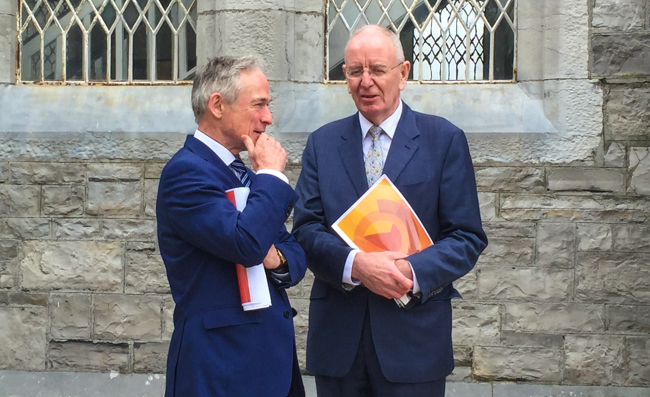Chair of the government’s higher education funding working group, Peter Cassells, has suggested that there could be a compromise on the three options outlined in the group’s report, which was published in July.
Speaking during a presentation to the Oireachtas Education and Skills Committee, Cassells said that, in their discussions of a new funding model, the committee could “end up with a hybrid”.
Commenting on each option put forward by the report – the abolition of the student contribution and the creation of a predominantly state-funded system, the continuation of the current student contribution charge coupled with increased state investment, and the introduction of an income-contingent loan system – Cassels said “each options has strength and weaknesses”.
Describing the three options as “overlapping circles”, he said there was nothing to rule out a new funding model that included characteristics from the three distinct funding models.
During the presentation to the committee, Cassells repeatedly stated that the decisions on a new funding model were “political and societal decisions”. The report, he said, would let “people decide from a political perspective”.
He called on the committee to set aside their “preferences”, warning that if certain options were automatically excluded, the committee would only return to the “status quo”. This, he warned, would create “deep costs” to the “student experience”.
Cassells listed the disadvantages of each model. A large increase in taxes would be required for the first model, while the second option would mean that education is not free at the point of access. Commenting on the third option, which would see the introduction of income-contingent loans, he said that while the system would be free at the point of access it would raise concerns over “debt aversion” among families from disadvantaged backgrounds and would also require significant borrowing by the state to set up.
The suggestion that there could be a compromise follows comments by the Minister for Education and Skills, Richard Bruton, in an interview with The University Times in September, when he stated also stated that a “compromise” on the three options could be possible.
Concerns have been expressed already about the possibility of a compromise on the three options outlined in the report. Speaking to The University Times following the report’s publication, IMPACT organiser, Joe O’Connor, former President of the Union of Students in Ireland (USI)and a member of the Cassells working group, said: “I certainly would not like to see a scenario where the committee does the work of the expert group again. I don’t think that’s its role. I think its role is to look at the options, assess them and make a choice.”
The cross-party Oireachtas Education and Skills Committee is currently considering the report of the government’s higher education funding working group, commonly referred to as the Cassells report. Last week, in a response to a question from The University Times, Bruton stated that he hoped a “consensus” on a new funding model for higher education could be reached by the next budget in 2018.
This appeared to contradict the timeline set out in the government’s Action Plan for Education, which set the second quarter of 2017 as the timeline for the implementation of a new funding model.
In his final remarks to the committee as part of his opening statement, Cassells said: “We now have an opportunity to recommit ourselves and reinvest in higher education”, calling on the committee to acknowledge the need for a “comprehensive and fundamental change to our funding model”.







